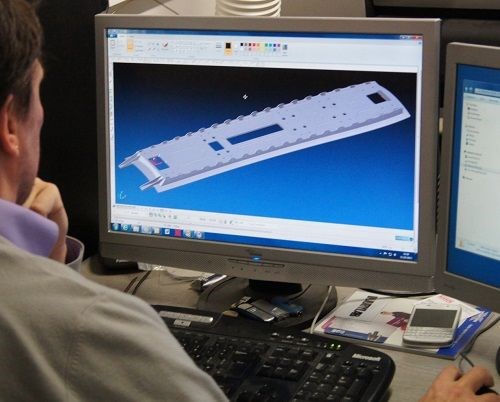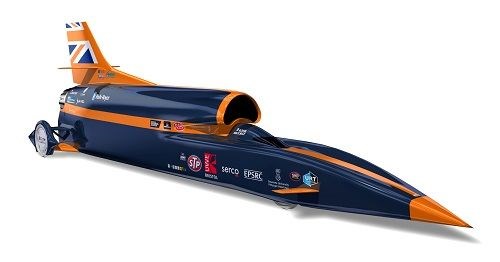Bloodhound Fin Support Machined with Vortex
Machining strategy contributes to 40 percent cycle time saving on large five-axis aluminum part.
Share






Five-axis machining may be challenging, but it’s not rocket science. Except when it is.
The Bloodhound is a 1,000-mile-per-hour rocket-powered car being developed to break the world land speed record, possibly this year. Though it’s named for a , the Bloodhound car will maintain missile-like speed entirely on the surface.
We’ve reported before on a made for this car. News of one of the latest examples of an unusual part for this car come from Delcam, whose PowerMill software and machining strategy figured into the five-axis machining of a tail-fin shear plate that will support the car’s large vertical fin at full speed.

The part shown on the screen in the previous image supports the car’s large vertical fin against the drag at full speed. Find images of the completed machined part posted .
According to this , the aluminum plate—machined by Manufax Engineering on a Correa five-axis gantry-type—is more than 2 meters long by 400 mm wide, but only 2 mm thick in some places, and precisely curved to follow the contour of the chassis. An aluminum block weighing 750 kg was milled down to less than 9 kg to make this part.
Delcam says the combination of tooling from SGS and tool paths achieving efficient engagement through Vortex allowed the part to be machined with over 40 percent less cycle time than it would have otherwise required.
Related Content
-
Orthopedic Event Discusses Manufacturing Strategies
At the seminar, representatives from multiple companies discussed strategies for making orthopedic devices accurately and efficiently.
-
How to Mitigate Chatter to Boost Machining Rates
There are usually better solutions to chatter than just reducing the feed rate. Through vibration analysis, the chatter problem can be solved, enabling much higher metal removal rates, better quality and longer tool life.
-
Ballbar Testing Benefits Low-Volume Manufacturing
Thanks to ballbar testing with a Renishaw QC20-W, the Autodesk Technology Centers now have more confidence in their machine tools.
















